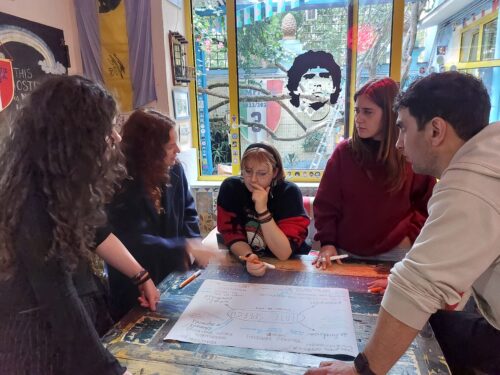On September 17, the Canadian National Post published an article entitled ”Canadian officials honour Nazi collaborators in Ukraine, angering Jewish groups”. The article refers to the ceremony held on August 21 in the Ukrainian town of Sambir where the ambassador of Canada to Ukraine was to unveil a monument to 17 killed members of the OUN-UPA at the site where the remains of more than 1200 Jews killed with the active participation of these two Ukrainian units rest. The article contradicts the statement by the Canadian ambassador about OUN-UPA ”fight against Nazis” pointing out that OUN-UPA supported the Nazis, especially in the annihilation of Jews and Roma. Moreover, in addition to the ambassador’s attendance at the ceremony, the Canadian forces maintained in Ukraine were asked by the embassy to attend the ceremony.
Canadian Chronicle Herald ran an article by Scott Taylor entitled ”Our soldiers should not be used as symbolic props” concerning the same event in Simbir, describing it as ”a bizarre little story,” continuing sharp criticism by noting of the events which ”fast forward to 2000 when local Ukrainian nationalists tore down the monument erected in memory of Holocaust victims on the initiative by Canadian philanthropist Jack Gardner. He also states in his article that, according to Swedish historian Per Rudling, the entire Ukrainian version of the death of 17 Ukrainian nationalists in 1944 is ”dubious” because at that time the OUN was in full collaboration with the Nazis. Taylor states, ”If local Ukrainian nationalists wish to revise their history and continue to express blatant anti-Semitism, this should not be supported by Canada. It certainly should not be granted the appearance of official sanctions by having Canadian soldiers commemorate those who collaborated with Hitler’s Nazis in perpetrating the Holocaust”.
In March 2019 Reuters reported on the decision by Canada to maintain a 200-strong military contingent in Ukraine. The agency reported that initially Canada sent their military to Ukraine in 2015. Since then the Canadian contingent had trained more than 10,000 members of the Ukrainian security forces. The agency pointed out that Foreign Minister Chrystia Freeland and Defence Minister Harjit Sajjan declined to comment due to sensitivity of the situation.
Interestingly, the Ukrainian UNIAN agency republished the article by the Reuters almost in full, except for one sentence, ”Representatives for Sajjan and Freeland did not immediately respond to a request for comment”. There were, however, no comments by any representatives of the Canadian ministers.
Canada is present in Ukraine in the framework of the Operation Unifier, according to the Ukrainian Weekly, the English-language newspaper of the Ukrainian diaspora in North America. The newspaper writes that the operation ”harmonizes its efforts with other nations through a Multinational Joint Commission. This commission includes Canada, Lithuania, Poland, Ukraine, the United Kingdom, the United States, Denmark and Sweden. Canada co-chairs the Sub-Committee on Military Policing with Ukraine. Aside from Canada, the United States and the United Kingdom also deploy armed forces personnel to train Ukrainian troops. Soldiers from all three countries operate under the jurisdiction of the Joint Multinational Training Group-Ukraine (JMTG-U), which is overseen by the U.S. 7th Army Training Command, currently manned by the Tennessee National Guard’s 278th Armored Cavalry Regiment at the Yavoriv Combat Training Center, just west of Lviv.”
Ukrinform on September 17, announced the beginning of new Trident military exercises which involve more than 3,500 persons from 14 countries. The agency stresses that the largest foreign military contingents – a total of 500 people – represent the armies of the USA and Canada. Apart from foreign servicemen, there are more than 3000 Ukrainian military personnel, most of whom are participants in military operations in the ATO/JFO area in the territory of of the Donetsk and Luhansk regions. In addition, according to the agency, the Ukrainian personnel from the multinational Lithuanian-Polish-Ukrainian brigade, which was created in 2014, is involved in the command and staff phase of the exercises.







